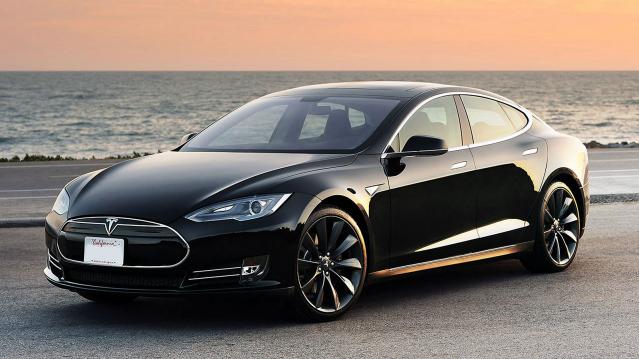A Red-Hot Tesla Burns Rubber on Consumer Reports

The Tesla Model S P85D sedan just broke the Consumer Reports rating system.
By definition, a car can’t exceed a score of 100 on the road test. But after the P85D racked up a score of 103, Consumer Reports was forced to create a new benchmark for the system and overhaul the ratings process according to a news release. The new system caused the car to slip to a score of 100.
A few characteristics of the car that allowed it to perform better in the test than any other car ever before include its rapid acceleration ability (0 to 60 mph in 3.5 seconds), its remarkable energy-efficiency (the car gets the equivalent of 87 miles per gallon) and its better breaking and handling system than the former top-scoring standard Model S. Two years ago, the base model version of the Model S received a 99 out of 100, which at the time was the highest rating ever for a vehicle.
Related: Why Americans Are Keeping Their Cars Longer Than Ever
The report is careful to note that even with a perfect score, the Tesla isn’t a perfect car. Besides a price tag of $127,820, beyond the means of the average person and the most expensive car Consumer Reports has ever reviewed, the car is louder than the base Model S and isn’t as plush as other luxury vehicles.
In addition, a long drive might be problematic if there aren’t any nearby charging stations along the route due to the vehicle’s 200-plus mile range. The rating also doesn’t account for the Tesla’s reliability, but the Model S comes with average reliability, according to owner-survey responses.
Imperfections aside, the car received an enviable final assessment. “It’s a remarkable car that paves a new, unorthodox course, and it’s a powerful statement of American startup ingenuity,” the report reads.
Increasing Number of Americans Delay Medical Care Due to Cost: Gallup

From Gallup: “A record 25% of Americans say they or a family member put off treatment for a serious medical condition in the past year because of the cost, up from 19% a year ago and the highest in Gallup's trend. Another 8% said they or a family member put off treatment for a less serious condition, bringing the total percentage of households delaying care due to costs to 33%, tying the high from 2014.”
Number of the Day: $213 Million

That’s how much the private debt collection program at the IRS collected in the 2019 fiscal year. In the black for the second year in a row, the program cleared nearly $148 million after commissions and administrative costs.
The controversial program, which empowers private firms to go after delinquent taxpayers, began in 2004 and ran for five years before the IRS ended it following a review. It was restarted in 2015 and ran at a loss for the next two years.
Senate Finance Chairman Chuck Grassley (R-IA), who played a central role in establishing the program, said Monday that the net proceeds are currently being used to hire 200 special compliance personnel at the IRS.
US Deficit Up 12% to $342 Billion for First Two Months of Fiscal 2020: CBO

The federal budget deficit for October and November was $342 billion, up $36 billion or 12% from the same period last year, the Congressional Budget Office estimated on Monday. Revenues were up 3% while outlays rose by 6%, CBO said.
Hospitals Sue to Protect Secret Prices

As expected, groups representing hospitals sued the Trump administration Wednesday to stop a new regulation would require them to make public the prices for services they negotiate with insurers. Claiming the rule “is unlawful, several times over,” the industry groups, which include the American Hospital Association, say the rule violates their First Amendment rights, among other issues.
"The burden of compliance with the rule is enormous, and way out of line with any projected benefits associated with the rule," the suit says. In response, a spokesperson for the Department of Health and Human Services said that hospitals “should be ashamed that they aren’t willing to provide American patients the cost of a service before they purchase it.”
See the lawsuit here, or read more at The New York Times.
A Decline in Medicaid and CHIP Enrollment

Between December 2017 and July 2019, enrollment in Medicaid and the Children's Health Insurance Program (CHIP) fell by 1.9 million, or 2.6%. The Kaiser Family Foundation provided an analysis of that drop Monday, saying that while some of it was likely caused by enrollees finding jobs that offer private insurance, a significant portion is related to enrollees losing health insurance of any kind. “Experiences in some states suggest that some eligible people may be losing coverage due to barriers maintaining coverage associated with renewal processes and periodic eligibility checks,” Kaiser said.


